- WAL may reach a high of $1.350 in 2025, driven by increased adoption and market sentiment.
- Q4 2025 is expected to be the strongest quarter, with a potential rally above $1.00.
- Price is expected to average around $0.750 in 2025 if WAL holds above dynamic support zones.
Walrus (WAL) is a decentralized data storage protocol developed on the Sui blockchain by Mysten Labs. It is designed to solve major infrastructure bottlenecks in Web3, offering scalable and efficient storage for unstructured data such as videos, images, and audio files. With its cross-chain capabilities and programmable storage, Walrus is geared toward becoming a core data layer for next-generation decentralized applications.
Table of contents
- Key features of Walrus
- WAL token utility and economics
- Market performance
- Use cases
- Walrus (WAL) Price Prediction 2025-2030 Overview
- Bollinger Band Analysis for Walrus (WAL)
- MACD Analysis for Walrus (WAL)
- Relative Strength Index (RSI) Analysis for Walrus (WAL)
- Support and resistance levels for Walrus (WAL)
- Immediate Support Levels
- Immediate Resistance Levels
- Breakout and Breakdown Levels
- Walrus (WAL) 2025 Price Prediction Analysis
- Q1 2025 (January–March)
- Q2 2025 (April–June)
- Q3 2025 (July–September)
- Q4 2025 (October–December)
- Summary Table
- Walrus (WAL) Price Prediction for 2026
- Walrus (WAL) Price Prediction for 2027
- Walrus (WAL) Price Prediction for 2028
- Walrus (WAL) Price Prediction for 2029
- Walrus (WAL) Price Prediction for 2030
- FAQs
Key features of Walrus
Interoperability
Walrus supports compatibility with both the Ethereum Virtual Machine (EVM) and the Cosmos ecosystem. This enables developers to easily port dApps to Walrus from Ethereum and ensures seamless communication across different blockchain networks.
High performance and low transaction fees
The protocol enables fast data processing at low cost, making it highly suitable for DeFi and NFT use cases. Its design reduces latency and avoids the high gas fees typically associated with traditional Layer-1s.
Energy-efficient consensus
Walrus runs on a Proof of Authority (PoA) consensus mechanism. This model minimizes energy consumption by relying on a select set of trusted validators, while maintaining a good balance between decentralization and performance.
WAL token utility and economics
Payment
WAL is used to pay for storage services within the protocol. Storage fees are structured to remain stable in fiat terms, insulating users from volatility in token price.
Security through staking
Users can stake WAL to help secure the network. Validators attract stake from users, and are rewarded or penalized based on performance. This helps distribute data efficiently and encourages accountability.
Governance
Token holders can vote on governance proposals and influence major protocol-level decisions, including upgrades, parameters, and long-term ecosystem initiatives.
Token supply
WAL launched with a total supply of 5 billion tokens. In its early roadmap, 4 percent of the supply was airdropped to community members, helping to decentralize token ownership from the start.
Market performance
After the mainnet launch and token generation event in late March 2025, WAL was listed on several major centralized exchanges. The token quickly surged to an all-time high of $0.60, before stabilizing around $0.52 in early April. It holds a market capitalization of approximately $667 million, with a circulating supply near 1.28 billion tokens.
Use cases
- Decentralized storage for rich media and large files
- Data backbone for AI models, metaverse, and DeFi applications
- On-chain programmable data logic
- Cross-chain asset hosting and interoperability layer
Walrus (WAL) Price Prediction 2025-2030 Overview
| Year | Minimum Price (USD) | Average Price (USD) | Maximum Price (USD) |
| 2025 | 0.400 | 0.750 | 1.350 |
| 2026 | 0.620 | 1.100 | 1.980 |
| 2027 | 0.850 | 1.430 | 2.600 |
| 2028 | 1.180 | 1.880 | 3.150 |
| 2029 | 1.500 | 2.420 | 3.850 |
| 2030 | 1.900 | 3.000 | 4.700 |
Bollinger Band Analysis for Walrus (WAL)
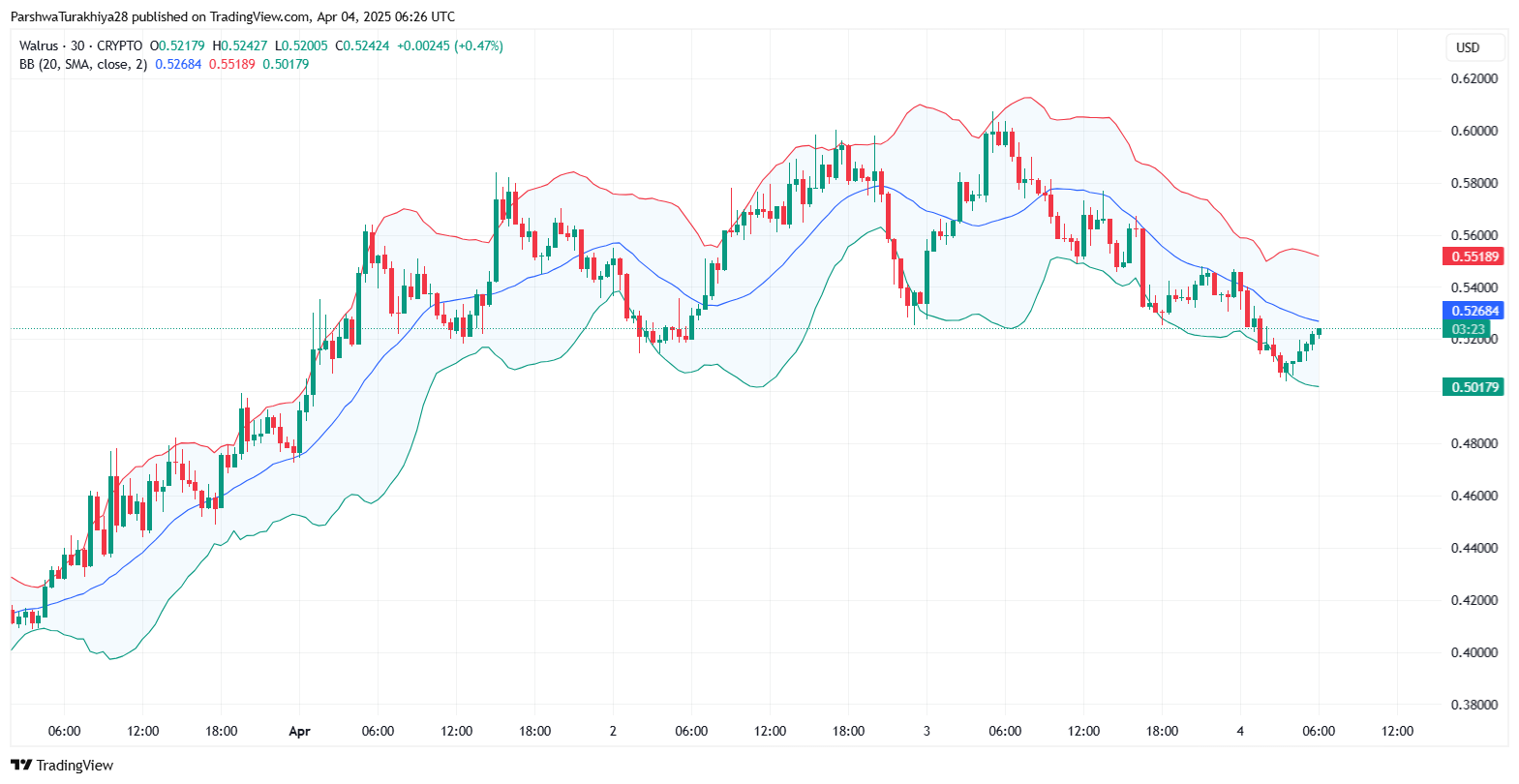 Walrus (WAL) price chart (Source: TradingView
)
Walrus (WAL) price chart (Source: TradingView
)
The Bollinger Bands for WAL are currently exhibiting a moderately contracted range, indicating reduced volatility in the recent session. The price is trading just under the midline of the bands (20-SMA), which is currently placed around $0.526. The upper band lies near $0.552, while the lower band is at $0.501. WAL’s price briefly touched the lower band before recovering toward the median, suggesting a potential reversal attempt or short-term mean reversion.
However, the lack of expansion in the bands implies that no strong breakout is underway. For a clear bullish bias, the price needs to break and sustain above the upper band with increasing volume. On the downside, if WAL revisits the lower band and fails to hold, it could enter a fresh bearish leg below $0.50.
MACD Analysis for Walrus (WAL)
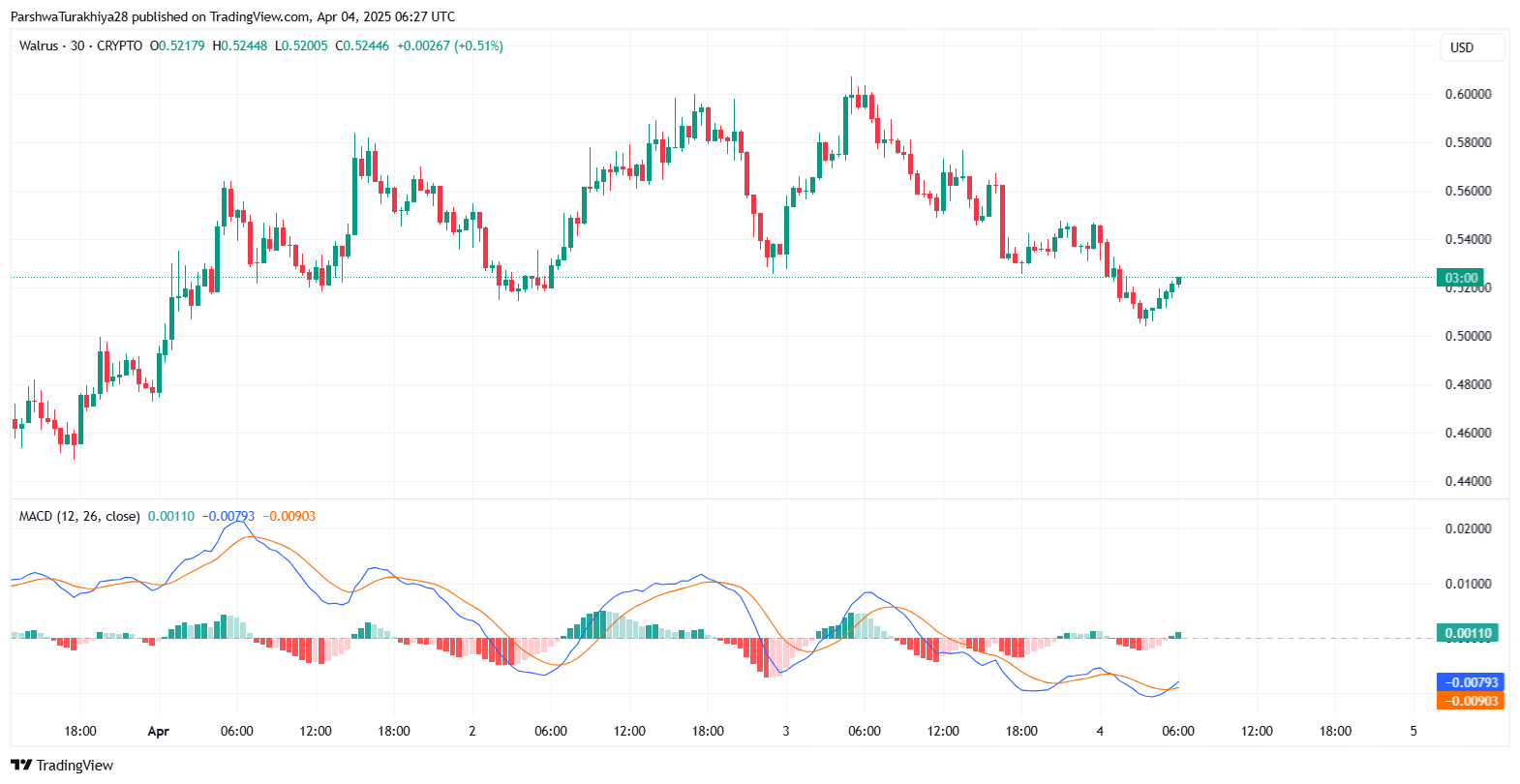 Walrus (WAL) price chart (Source: TradingView
)
Walrus (WAL) price chart (Source: TradingView
)
The MACD (12, 26) currently displays a developing bullish crossover, with the MACD line at 0.00110 inching above the signal line at -0.00903. This crossover marks a potential shift in momentum from bearish to bullish. However, the preceding histogram bars were dominantly red and strong, signaling persistent bearish pressure through the last 24 hours. The current histogram has just flipped into green, but the bars remain shallow, indicating the bullish shift is tentative and lacks volume-based confirmation.
Traders should monitor whether the MACD line continues diverging from the signal line or if it flattens again. A strong move into positive MACD territory could support a retest of the $0.55–$0.57 resistance zone, while failure to sustain the crossover would open the door to further downside probing below $0.51.
Relative Strength Index (RSI) Analysis for Walrus (WAL)
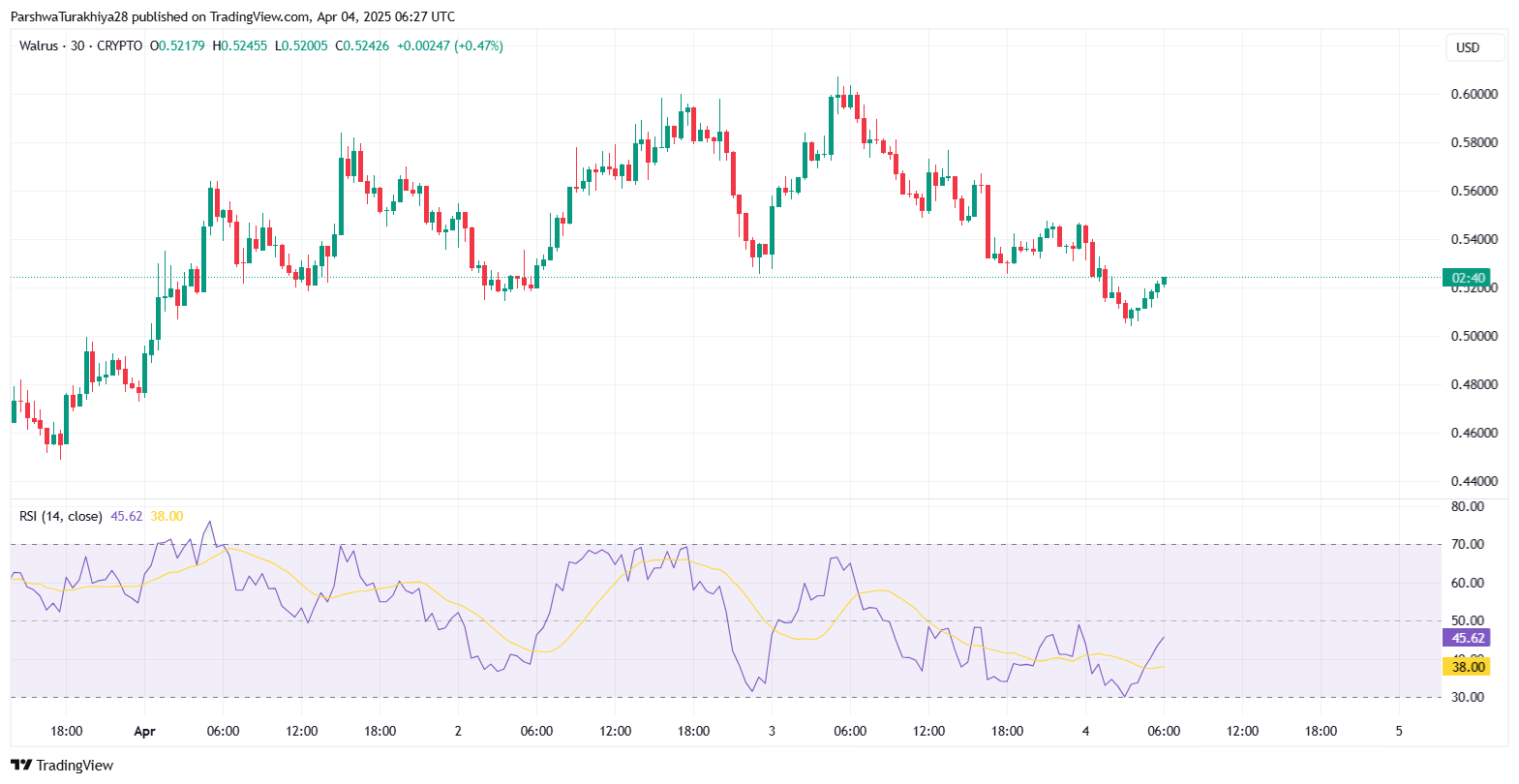 Walrus (WAL) price dynamics (Source: TradingView
)
Walrus (WAL) price dynamics (Source: TradingView
)
The Relative Strength Index (RSI) is currently reading 45.62, rebounding from a recent low near 38. This move signals a gradual recovery in momentum after a brief oversold condition earlier this session. Importantly, the RSI has crossed above its moving average line (currently around 38), which historically has acted as a trigger for short-term bullish attempts.
However, it is still below the 50 threshold, indicating that market strength is neutral at best. A sustained move above 50 would indicate rising momentum and possible upward continuation, but if RSI begins to falter near 48–49, it may validate a false breakout and suggest a continuation of the corrective phase. Overall, RSI shows early recovery signs, but no strong conviction just yet.
Support and resistance levels for Walrus (WAL)
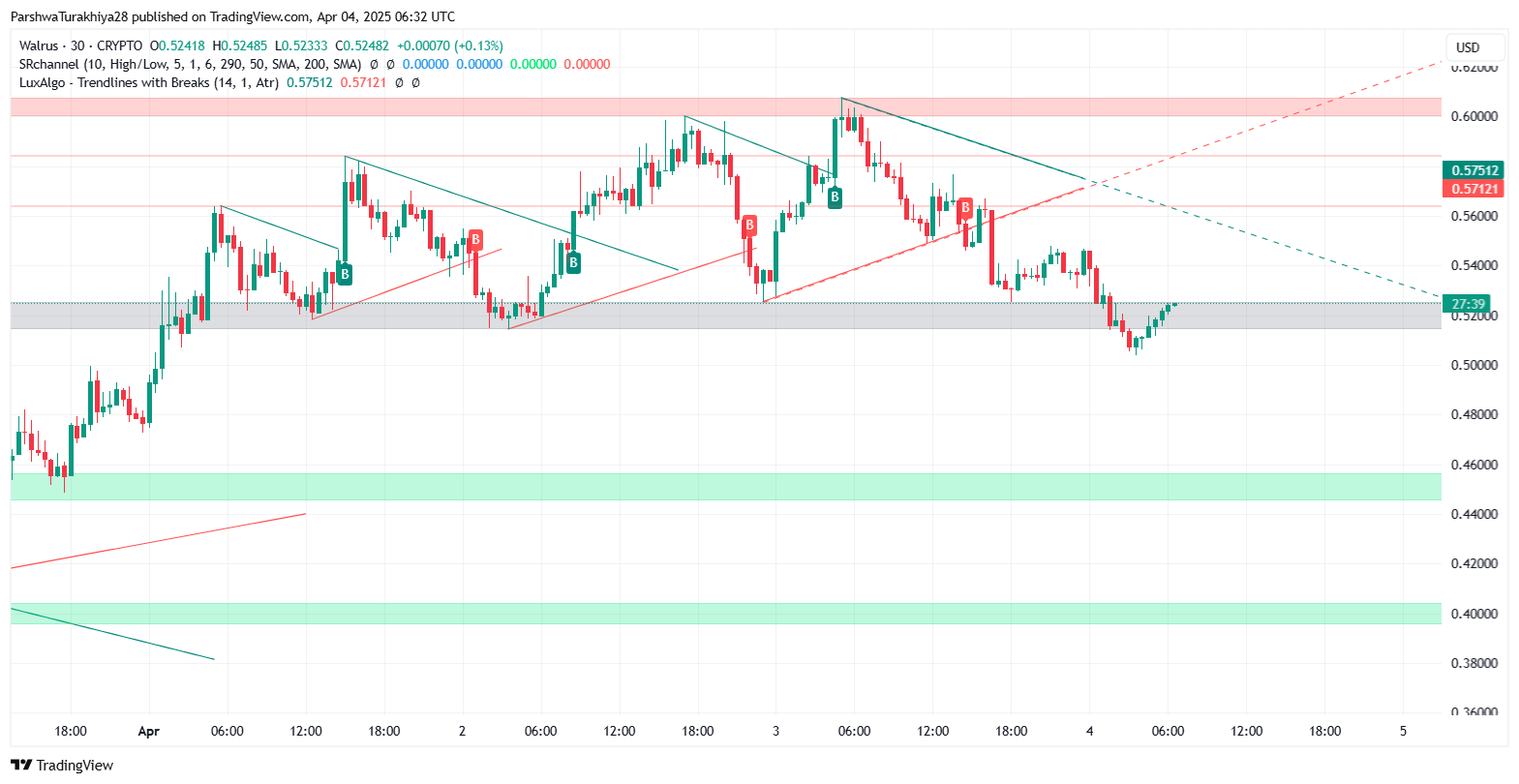 Walrus (WAL) price chart (Source: TradingView
)
Walrus (WAL) price chart (Source: TradingView
)
Immediate Support Levels
- $0.75-$0.80: This region has historically acted as a strong demand zone. A breakdown below this could lead to a further correction toward lower levels.
- $0.60-$0.65: A more critical support level where ADA consolidated before its recent breakout. This range is crucial in case of a deeper correction.
Immediate Resistance Levels
- $1.00-$1.05: The psychological resistance zone where ADA previously faced selling pressure. A breakout above this level would likely open doors for a move toward $1.15.
- $1.15-$1.20: A strong resistance area that aligns with previous swing highs. If ADA breaks past this region, it could trigger a more extended rally.
Breakout and Breakdown Levels
- Breakout Above $1.10: If ADA clears this resistance with strong volume, it could indicate the start of a more extended bullish cycle, pushing toward $1.25-$1.30.
- Breakdown Below $0.75: If ADA loses support at this level, it could trigger a retest of $0.60-$0.65, which remains a critical zone for bullish recovery.
Walrus (WAL) 2025 Price Prediction Analysis
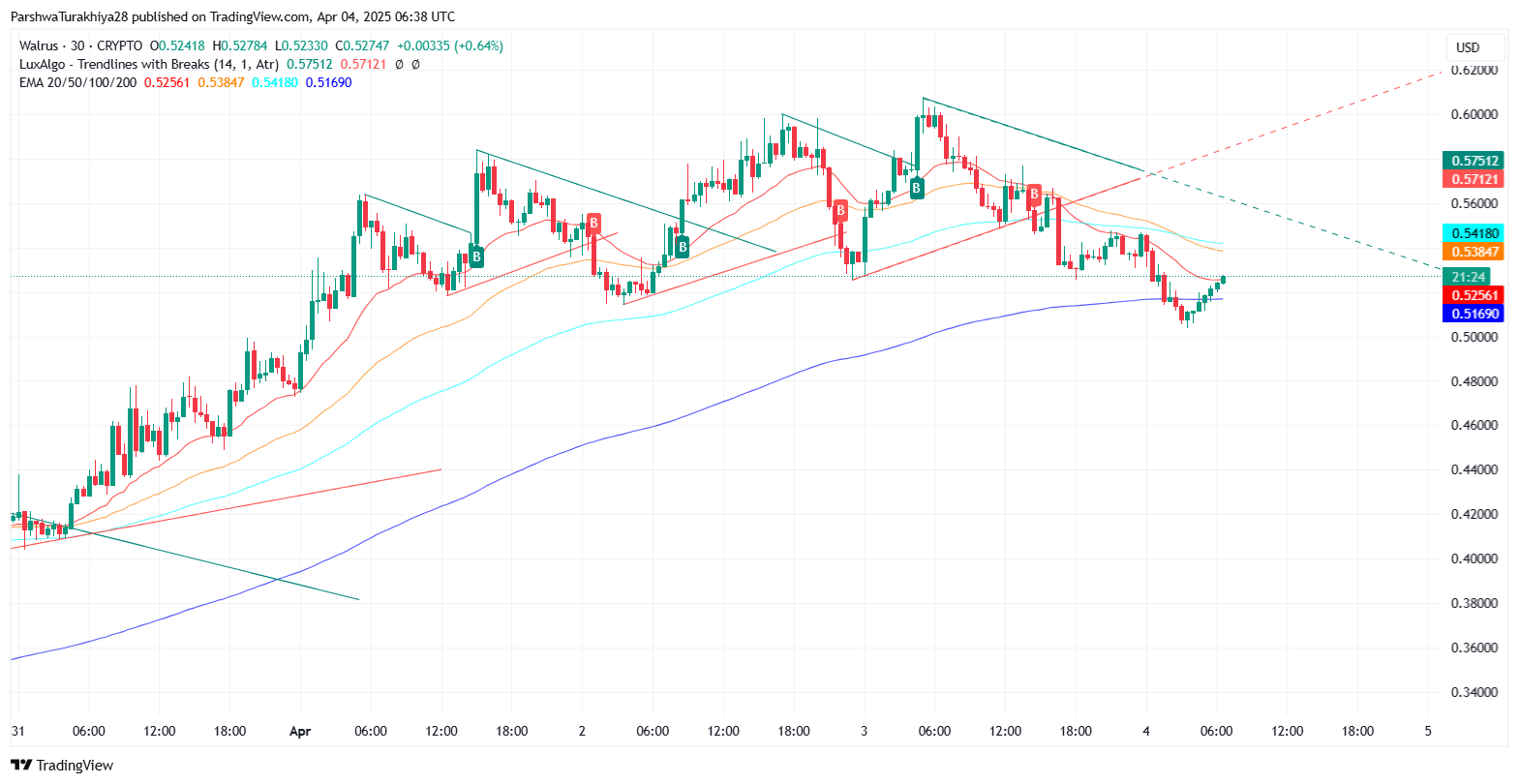 Walrus (WAL) price analysis 2025 (Source: TradingView
)
Walrus (WAL) price analysis 2025 (Source: TradingView
)
Q1 2025 (January–March)
Walrus saw its first major breakout early in the year, moving from near-flat zones to establishing a base above $0.500. The 20- and 50-EMA gradually turned bullish, with consistent higher lows forming a short-term uptrend. Momentum was supported by strong candlestick volume spikes. However, this quarter was mostly about discovery and establishing liquidity, leading to large wicks on both sides.
- Minimum: $0.400
- Average: $0.550
- Maximum: $0.750
Q2 2025 (April–June)
As of April, WAL is trading around $0.525–$0.530, rebounding off the 200-EMA near $0.516, which is acting as solid dynamic support. The price has recently tested and recovered above the 20 and 50 EMA near $0.525–$0.538, suggesting short-term bullish momentum building. A bullish breakout above the descending trendline and reclaiming the $0.575 zone could push the price toward $0.80. However, sideways movement may continue if volume remains weak.
- Minimum: $0.480
- Average: $0.640
- Maximum: $0.820
Q3 2025 (July–September)
Assuming the EMAs continue upward and the price closes multiple candles above the $0.580–$0.600 zone, Q3 could bring sustained bullish momentum. This quarter may see a retest of the $0.90 psychological level if Walrus expands on-chain utility or attracts social hype. The 100-EMA crossover with the 50-EMA will also be critical to watch during this phase for further confirmation of trend reversal.
- Minimum: $0.600
- Average: $0.780
- Maximum: $1.050
Q4 2025 (October–December)
This quarter could define WAL’s breakout potential. If the crypto market enters a bull cycle or the project sees positive token-specific catalysts, the asset may target the projected yearly maximum of $1.350. However, exhaustion signals or failure to hold above $1.00 may trigger pullbacks back to $0.80–$0.90 for consolidation. A Fibonacci extension from the Q1–Q3 rally also places $1.32–$1.35 as a natural resistance extension.
- Minimum: $0.750
- Average: $0.950
- Maximum: $1.350
Summary Table
| Quarter | Minimum (USD) | Average (USD) | Maximum (USD) |
| Q1 | 0.400 | 0.550 | 0.750 |
| Q2 | 0.480 | 0.640 | 0.820 |
| Q3 | 0.600 | 0.780 | 1.050 |
| Q4 | 0.750 | 0.950 | 1.350 |
This projection assumes gradual organic growth, successful technical retests above major moving averages, and no critical breakdown below the 200-EMA. If these levels fail, downside risk to $0.420 remains. Otherwise, the structure supports a slow but defined uptrend throughout 2025.
Walrus (WAL) Price Prediction for 2026
In 2026, Walrus may experience its first sustained growth cycle if it builds on 2025’s momentum and maintains user adoption. With the average forecast around $1.100, the token is likely to consolidate above the psychological $1.00 mark, setting a foundation for larger moves. Strong community engagement or protocol upgrades could push it toward $1.980, while downside risk may hold near $0.620 if broader market volatility increases.
Walrus (WAL) Price Prediction for 2027
As WAL matures, 2027 may witness an expansion phase supported by potential listings or integration into broader ecosystems. With price projections between $0.850 and $2.600, the year could offer both volatile surges and healthy corrections. The average price of $1.430 reflects increased investor confidence and higher network activity, especially if Walrus aligns with DeFi or GameFi narratives.
Walrus (WAL) Price Prediction for 2028
By 2028, WAL may transition into a more stabilized mid-cap asset, with deeper liquidity and expanding use cases. If infrastructure improvements and token utility strengthen, the token could average around $1.880, with a possible peak at $3.150. The lower end of $1.180 suggests accumulation zones could form during market pullbacks or macro slowdowns.
Walrus (WAL) Price Prediction for 2029
Walrus may begin commanding larger market presence in 2029 as adoption scales and project fundamentals are reflected in valuation. The range of $1.500 to $3.850 indicates potential for both bullish extension and re-accumulation, depending on investor sentiment. The average price near $2.420 positions WAL in a growth phase, likely benefiting from a maturing Web3 economy.
Walrus (WAL) Price Prediction for 2030
In 2030, if Walrus delivers on ecosystem expansion, token economics, and real-world integration, the price could average $3.000 with upside projections hitting $4.700. The token may see institutional interest or become part of cross-chain liquidity models. The $1.900 minimum could act as a long-term floor, reflecting solid base support after a full cycle of adoption and utility-driven valuation.
FAQs
WAL is forecasted to trade between $0.400 and $1.350 in 2025, with an average price near $0.750.
Yes, if market momentum and protocol developments align, WAL may break past $1.00 in Q4 2025.
Key factors include increased storage demand, breakout above resistance zones, and broader crypto market recovery.
Yes, $0.400 reflects historical accumulation zones and may act as the base during corrections.
Key resistance zones include $0.820, $1.050, and $1.350 based on technical patterns and volume profiles.
They are based on technical indicators, volume trends, and macro conditions, offering directional insights, not certainties.
If it fails to hold the 200 EMA and volume weakens, WAL may retest $0.48–$0.50 support briefly.
Yes, Q3 and Q4 show strong potential if WAL confirms EMA crossover and breaks trendline resistance.
Utility in storage payments, staking, and governance increases demand, supporting long-term price appreciation.
Absolutely. Overall market sentiment, especially Bitcoin and Layer-1 trends, will heavily influence WAL’s price action.
Disclaimer: The information presented in this article is for informational and educational purposes only. The article does not constitute financial advice or advice of any kind. Coin Edition is not responsible for any losses incurred as a result of the utilization of content, products, or services mentioned. Readers are advised to exercise caution before taking any action related to the company.

